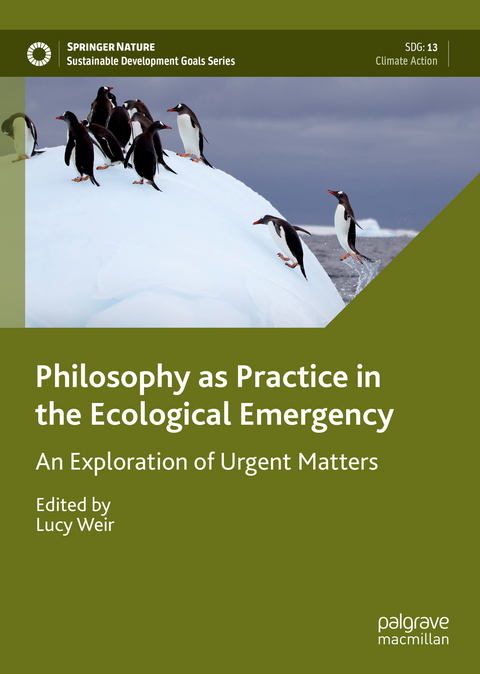
Philosophy as Practice in the Ecological Emergency
Springer International Publishing (Verlag)
978-3-030-94390-5 (ISBN)
This book argues that philosophy is as practical as plumbing and what we need right now is what philosophers can offer as philosophers to help us all, our species, and beyond, through this ecological emergency, this climate change, this anthropocene.
This book is about the meaning and purpose of philosophy as a way of, a practice of, responding to the ecological emergency, which includes climate change, biodiversity loss, pollution, habitat destruction, and all the associated impacts that fragment, and threaten to create collapse, among the systems that created and sustain us. There are the related economic and social impacts, the fragmentation of communities and political ideologies through attitude polarisation, and the increasing threats to systems by those who seek to promote further exploitation at the expense of attempts to regain some system of cooperation and an attitude of compassion which is at the heart of our survival strategies as a species.
Philosophy has always sought to address questions related both to our place in the universe, and to how to live, given our understanding of our place. Those of us committed to a philosophical life have used a range of metaphors and narratives to enlighten, and to exhort to action, those who would seek to understand what to do, how, and why. Philosophy has played a key role in helping us as a species to respond to the ecological emergency. What, then, is the practice of philosophy, given that we're in an ecological emergency?
This question is the thread, and it forms the framework for the dialogue that runs through the book.
Lucy Weir was awarded her PhD in Philosophy at University College Cork, and now works as an Independent Scholar , writer and yoga teacher. She is the author of 'Love is Green: Compassion as Responsibility in the Ecological Emergency' (Vernon Press, 2020), and her research interests include evolutionary science, Zen and and Buddhist philosophy, and the environmental crisis.
Chapter 1. Introduction.- Chapter 2. Beginning with the Good of System.- Chapter 3. Physics, Feminism and Whakapapa; Integrating EcoSubjectivity After the Enlightenment.- Chapter 4. We Are the Emergency.- Chapter 5. Justice in the Ecological Emergency: The Search for the Common Good.- Chapter 6. Philosophy as Ecological Practic.- Chapter 7. Reconciling Hungry Spirits in the Ecological Emergency.- Chapter 8. Equality: Industrial Capitalism's Trojan Horse Environmental Racism, Green Colonialism, and The Renewable Energies Revolution.- Chapter 9. Learning to See 'Green' in an Ecological Crisis.- Chapter 10. Guidelines for a Post-speciesist Epistemology in the Age of Anthropocene.- Chapter 11. Breakthrough Compass: Navigating the Injustices of the Ecological Emergency.- Chapter 12. The Capabilities Approach and the Environment.- Chapter 13. Secular Stewardship in the Ecological Emergency.- Chapter 14. Conclusion: Learning to Live, Learning to Die./
| Erscheinungsdatum | 23.04.2022 |
|---|---|
| Reihe/Serie | Sustainable Development Goals Series |
| Zusatzinfo | XV, 279 p. 14 illus. |
| Verlagsort | Cham |
| Sprache | englisch |
| Maße | 148 x 210 mm |
| Gewicht | 514 g |
| Themenwelt | Geisteswissenschaften ► Philosophie |
| Naturwissenschaften ► Biologie ► Ökologie / Naturschutz | |
| Schlagworte | attitude polarisation • Biodiversity Loss • climate change • compassionate attunement • ecological emergency • Enlightenment • Resilience |
| ISBN-10 | 3-030-94390-9 / 3030943909 |
| ISBN-13 | 978-3-030-94390-5 / 9783030943905 |
| Zustand | Neuware |
| Informationen gemäß Produktsicherheitsverordnung (GPSR) | |
| Haben Sie eine Frage zum Produkt? |
aus dem Bereich


